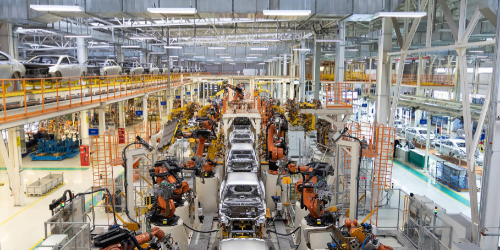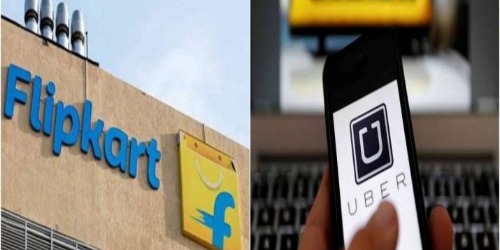Coronavirus impact: Steel demand to drop first time in 16 years in 2020; 7.7% dip expected

Demand for steel in India is forecast to decline by 7.7 per cent at 93.7 million tonnes in 2020 as the fallout of the coronavirus pandemic will see a contraction in demand in a range of sectors including infrastructure and real estate, automobiles, heavy machinery and railways, industry body Indian Steel Association has said. This would be the first time since 2004 that steel demand would contract in a year in India.
At the start of the year, ISA had projected a demand growth of 5.1 per cent for the industry but the revision was necessitated due to the extent of the pandemic that has forced India to go into a total lockdown for 40 days.
"Economic activities have come to a standstill but are expected to restart in a staggered manner after April 20, 2020. It is expected that any kind of demand recovery will take at least another month as overcoming challenges in the form of getting migrant labourers back into manufacturing / construction zones, resetting disrupted supply chains and overcoming liquidity constraints particularly towards working capital needs, cannot be accomplished overnight," ISA said in a statement.
The forecast for almost every sector that uses steel is downcast for this year. Construction, both infrastructure development and real estate development, accounts for the major chunk of steel use, is at a dead halt and recovery is expected to be weak due to the lesser availability of migrant construction workers. Similarly the automotive sector is grappling with supply chain disruptions, both abroad and within
the country and a recovery there is not expected before the beginning of the festive season in the last quarter of the year.
The heavy machinery sector is expected to see continued decline due to weaker private investment, fragile export demand and halted projects in renewable energy, construction and mining. The railways sector, one of the few bright spots in the last few years, is also likely to see deferment of its capex expenditures this year which will negatively affect growth in steel use.
"We expect growth in all the steel using sectors to remain in negative territory during 2020, before registering a smart recovery aided by a low base, in calendar year 2021," ISA said. "We estimate that the spread of the pandemic and subsequent lockdown will lead to steel demand declining by 13 million tons or by 12.2 percent from a business as usual scenario."
India is one of the few countries that has consistently registered a growth in demand for steel even as other economies have faltered. In the last 15 years, the country has jumped from ninth to second spot in the list of largest steel producing countries in the world. Even in this time of crisis, the decline in demand in India is likely to be much less than other nations and the recovery is likely to be faster. India is one of the only two countries along-with China that is expected to buck the trend and post a growth in GDP this year among all major economies of the world.
- 0
- Leave a comment
Industries In Rural Areas, E-Commerce Can Start On April 20

Some industries in rural areas, e-commerce, IT and farming will be allowed after April 20, the government said today in new guidelines a day after Prime Minister Narendra Modi extended the nationwide coronavirus lockdown till May 3 and said restrictions would be relaxed after a week in the least infected parts of India. The government says it will also allow the construction of roads and buildings in rural areas and the manufacture of IT hardware to reduce the distress of millions during a prolonged lockdown to slow the spread of coronavirus. States will be responsible for ensuring that all safety and social distancing protocols are in place, the home ministry guidelines say. The exemptions won't apply to hotspots -- areas with a large number of COVID-19 cases or showing a rapid rise in infection. PM Modi extended the restrictions as India crossed 10,000 coronavirus cases despite a 21-day lockdown.
Here's your 10-point cheatsheet on New Government Guidelines for lockdown:
1. Agricultural and related activities will resume fully to generate jobs for daily wagers and others. Industries operating in rural areas will be allowed with strict social distancing norms.
2. The inter-state transport of goods, essential and non-essential items, will be allowed after April 20. Highway ''dhabas'', truck repair shops and call centres for government activities can reopen from April 20. So can manufacturing units of pharmaceuticals and medical equipment.
3. "To provide an impetus to the rural economy, industries operating in rural areas, including food processing industries; construction of roads, irrigation projects, buildings and industrial projects in rural areas; works under MNREGA, with priority to irrigation and water conservation works; and operation of rural Common Service Centres have all been allowed. These activities will create job opportunities for rural labor, including the migrant labor force," the guidelines say.
4. Manufacturing and other industrial establishments with access control will be allowed in SEZs, EoUs, industrial estates and industrial townships after implementation of SOP for social distancing. Manufacture of IT hardware and of essential goods and packaging can resume.
5. Coal, mineral and oil production will be allowed.
6. The Reserve Bank of India, banks, ATMs, capital and debt markets as notified by SEBI and insurance companies will also remain functional, to provide liquidity and credit support to the industrial sectors.
7. The supply of milk, milk products, poultry and livestock farming and tea, coffee and rubber plantations will resume.
8. The government said the digital economy is critical to the services sector and national growth, so e-commerce, IT and IT-enabled services, data and call centres for government activities, and online teaching and distance learning are all permitted activities.
9. Important offices of Central and State Governments and local bodies will remain open with required strength.
10. All air, train and road travel, educational institutions; non-essential industrial and commercial activities, hotels, cinema halls, shopping complexes, theatres stay closed. Social, political and other events, religious centres and gatherings will also not be allowed.
Coronavirus lockdown: Auto sales crash 45% in March; commercial vehicles worst hit

The coronavirus-induced nationwide lockdown in the country has taken a toll on the domestic automobile industry, which registered a massive yet not so surprising 45 per cent decline in sales in March.
The industry recorded sales of just over 10 lakh during the month with commercial vehicles bearing the brunt. Factories and dealerships across the country have been shut since March 25 as the country is under lockdown in view of the spread of the pandemic.
Sale of trucks and buses saw a steeper 88 per cent decline with sale of just 13,027 units. Two-wheelers sales registered a 40 per cent dip with scooters witnessing a 32 per cent decline at 263,181 units while motorcycles saw a 42 per cent contraction at 570,860 units. Sale of passenger vehicles declined by 51 per cent at 143,014 units last month. These are all historic lows.
"The month of March 2020 was one of the most challenging months for the Auto sector as the 21-day lockdown resulted in bringing the production and sales of vehicles to a standstill in the last week. As the revenues took severe hit, the OEMs struggled on meeting fixed cost and working capital requirements," said Rajan Wadhera, president, SIAM.
For the full financial year 2019-20, the auto industry declined by 18 per cent at 2.15 crore units, registering its worst performance in over two decades. Passenger vehicles saw a 17.8 per cent decline at 27.7 lakh units, which pegged it back by five years to levels last seen in financial year 2015-16.
Two-wheelers also saw a similar 17.8 per cent fall in sales during the year at 1.74 lakh units while commercial vehicles registered a 28.7 per cent decline at 717,688 units.
"We are engaged in a dialogue with the government on policy measures which could minimise the impact of COVID on the Indian economy and especially the automobile industry," Wadhera added. "There would be challenges on the supply side; demand side and also on the issue of availability of Finance which would all need to be addressed to bring back growth in the sector. We remain steadfast on 'Building the nation responsibly'."
While the lockdown is set to be extended beyond April 14, SIAM has predicted more pain for the industry in fiscal 2021 as it would take much longer for consumer sentiment to be revived even after the lockdown is removed. With the overall economy likely to grow at a much slower clip, SIAM has predicted another 20 per cent decline in volumes this financial year if the GDP grows at less than 1 per cent.
Even in the most optimistic scenario of the GDP growing by 4 per cent this year, the automobile industry would still decline by 13 per cent, it has said.
Coronavirus lockdown: Uber teams up with Flipkart to deliver essentials in Mumbai, Bengaluru, Delhi

Ride hailing company Uber has entered into a partnership with e-commerce giant Flipkart to deliver essential supplies during the ongoing nationwide lockdown in the wake of the coronavirus outbreak. Flipkart, India's leading online marketplace, will use Uber's fleet to deliver its customers essential supplies across Delhi, Mumbai and Bangalore, the cab aggregator said in a blog post.
This happens to be Uber's third business to business (B2B) partnership within a week, following similar deals with Bigbasket and Kolkata-headquartered chain Spencer's Retail, said Prabhjeet Singh, director - operations, and head of cities, Uber India & South Asia.
"All these deals help in keeping citizens indoors so we can collectively support the government in helping contain the spread of COVID-19," Singh said.
He said that the cab service provider will not charge any commission for this service, so all the money earned through these deliveries will be given to drivers.
"In line with government guidelines to contain the spread of COVID-19, all drivers associated with this service are being provided masks, gloves, sanitisers, and specialised safety training to ensure the highest possible safety and hygiene standards," he added.
The deal will help Flipkart to move essential supplies from our sellers/ vendors to customers in the shortest possible span of time. Flipkart had temporarily suspended operations last week and later resumed services the same day after assurance of safe passage of its supply chain and delivery executives by local law enforcement authorities.
Last week, Uber announced it had partnered with grocery firm BigBasket to deliver essential products in Bengaluru, Hyderabad, Chandigarh and Noida.
Recently, the cab aggregator launched its UberMedic service to provide frontline healthcare workers safe, reliable and efficient transportation. The firm has tied up with the National Health Authority (NHA) to offer free UberMedic rides to healthcare workers in select locations for the next month. The deal will initially facilitate the provision of 150 cars free of cost to support medical facilities in New Delhi, Noida, Ghaziabad, Kanpur, Lucknow, Prayagraj and Patna.
ICICI Bank cuts interest rate on savings account, FDs

Private lender ICICI Bank has reduced interest rate on fixed deposits and savings account by up to 50 basis points (bps). The reduction in interest rates on savings accounts will be effective from April 9, while new rates on FDs will apply from April 3, 2020.
In a filing to the stock exchanges, the lender said it has cut interest rates on its fixed deposits (FDs) by up to 50 bps (1 bps = 0.01%) across various tenures. Now one-year FD will fetch an interest rate of 5.8% per annum, compared to 6.2% earlier, down 40 bps. While interest rate on two-year FDs has been reduced by 50 bps to 5.8%, five-year FDs by 40 bps to 6%.
These revised interest rates will be applicable for new deposits and renewal of existing term deposits, the bank said.
Besides, ICICI Bank has cut savings bank account interest rate by 25 bps with effect from April 9, 2020. For savings account balance below Rs 50 lakh, the interest rate will come down to 3.25% per annum from 3.5% per annum, and amount above Rs 50 lakh will earn 3.75% per cent.
The move came after the Reserve Bank of India (RBI) announced 75 bps cut in the repo rate on March 27. On the same day, State Bank of India, the country's largest lender, had cut its FD rates by up to 50 bps across various tenures.
Savings bank account interest is calculated on a daily basis on the daily closing balance in the account, at the rate specified by the bank in accordance with Reserve Bank of India directives.
Earlier on Tuesday, the government had announced reduction in interest rates on small savings schemes like the Public Provident Fund (PPF), Sukanya Samriddhi Yojana, post office term deposit and others, between 70 bps and 140 bps for the April-June period, with effect from April 1, 2020.


